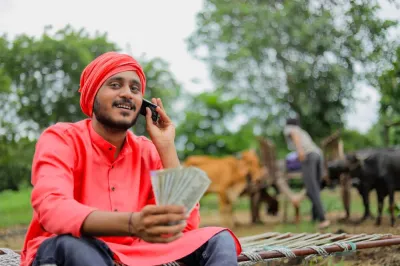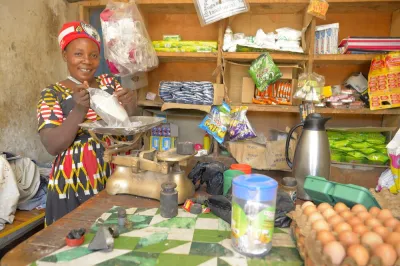Shifting Perspectives: From Financial Inclusion to Financial Health of Forcibly Displaced Persons (FDPs)

UNHCR recently launched the first ever Indicator Report to illustrate progress on the 2018 Global Compact on Refugees (GCR), in which commitments were made to enhance refugees’ self-reliance. The findings are bleak: an estimated two thirds of refugees currently live in poverty. While 75 percent of refugees legally have access to decent work, in practice this is much lower due to other restrictions. For instance, at least one third of refugees are not allowed to move freely. The economic downturn resulting from the pandemic has affected forcibly displaced persons (FDPs) more severely, as they are often confined to working in informal sectors with no social protection or benefits and therefore face higher income losses. The highest losses were for refugee women who faced the triple disadvantage of gender discrimination, displacement and COVID-19.
These worrying trends are confirmed by findings from an in-depth research project on Finance in Displacement (FIND), facilitated by the German Federal Ministry for Economic Cooperation and Development (BMZ) and Open Society Foundations. This research, which interviewed over 280 refugees in Jordan, Kenya, Uganda and Mexico, brings to light the challenges FDPs face in accessing economic opportunities and puts forth a financial health framework for measuring progress against these challenges.
A financial health framework for refugees
Building on work done by the Center for Financial Inclusion, the FIND research adopted a modified definition of financial health, focusing on outcomes that improve refugees’ financial lives. Refugees are financially healthy when they can not only meet basic needs, but also comfortably manage debt, recover from financial setbacks, make investments in opportunities such as education, training or better housing, and are able to extend their planning horizons and contemplate a financial future.
Access to financial services can contribute to financial health but it is not the only factor. We see that This in turn increases demand for varied formal financial services.
Struggling to access economic opportunities
Legal barriers, such as the right to work, and practical barriers, such as obtaining documents to secure permission to work, figure heavily into refugees’ struggles. One of FIND’s refugee respondents in Kenya described the bureaucratic challenges:
“I tried to get a work permit, but it did not work out. I went to UNHCR, and they gave me a document to take to a Huduma Center [office for government services]. When I got there, they asked me to ask my boss to write an official letter indicating that he has given me work. When I asked my boss, he refused and said he has not yet given me a job, only that he wanted a document to know if I’m allowed to work. I went back to the Huduma Center, and they said if there’s no letter, they can’t even start the process. I gave up.”
Restrictive social and gender norms can also play an important role in holding refugees back. Women with caregiving responsibilities cannot take on additional side jobs in the way that men do, and they have less access to diverse forms of capital. Fear of harassment and lack of access to justice contributes to refugee women’s isolation.
All of these constraints adversely affect both income and long-term investment opportunities of refugees, and ultimately, their financial health.
Struggling to access financial services
Refugees also face many barriers when it comes to accessing financial services, including:
- The application of global Anti-Money Laundering (AML) and Counter the Financing of Terrorism (CFT) standards that may not be commensurate to the level of risks they pose to the financial system.
- Language barriers.
- Lack of grievance processes to redress problems.
In addition, refugees are often only given access to limited or nascent services that aren’t widely used by the host population. In Jordan, Syrian refugees have access to mobile money with their refugee ID, but use cases and network infrastructure are still limited, a problem the Digi#ances project aims to address.
Key steps to make progress on refugees’ financial health
What do we need to do to make sure that FDPs can become financially healthy? As we have seen, their financial health depends not only on access to financial services but also to economic opportunities, which requires access to fundamental rights related to work, movement and documentation.
The ongoing COVID-19 pandemic as well as new and re-emerging crises are testing international support for refugees and the communities and countries that host them. However, the implementation of recommendations laid out in the Roadmap to the Sustainable and Responsible Financial Inclusion of FDPs, as well as the commitments made under the GCR, have the potential to increase the financial health of refugees. The UNHCR report is an important step for more regular monitoring and accountability towards GCR commitments.
At the upcoming High-Level Officials Meeting that monitors the implementation of the GCR, urgent action needs to be taken to implement these commitments:
- Host countries, with financial and technical support from the international community, should make urgent further progress in addressing regulatory barriers to work, movement, documentation and gender equality - prerequisites for increasing refugees’ financial health in a meaningful way.
- Financial regulators in host countries also need to make efforts to further assess and address regulatory barriers for refugees to access mainstream financial services, including those related to documentation or unintended consequences of AML/CFT measures.
In addition, GCR stakeholders need to gather data on financial health that is disaggregated by gender and displacement status, in addition to age and other demographic and ethnographic characteristics. This will help to address FDPs’ unique needs and distinct challenges, and allow for more nuanced monitoring of progress, including for women and girls, towards the commitments made in the Global Compact.
These key steps are necessary to make progress on refugees’ financial health, to ensure that they can not only meet basic needs, but also take advantage of economic opportunities and move towards a positive financial future.
For more on financial health, check out the FinDev Blog Series, A Global Movement to Focus on Financial Health.
Finance in Displacement: Joint Lessons Report
Managing finances is challenging for most people, but it is truly daunting for migrants and refugees. They face numerous hurdles that range from obtaining the right documents to securing permission to work—obstacles that limit both their income and their opportunities to make longer-term investments.
Between 2019 and 2021, the IRC partnered with Catholic University Eichstaett-Ingolstadt and Tufts University for the Finance in Displacement (FIND) research project, which interviewed over 280 forcibly displaced persons (FDPs) in Jordan, Kenya, Uganda and Mexico. The final report brings to light the challenges FDPs face in accessing economic opportunities and puts forth a financial health framework for measuring progress against these challenges.



Great article! I agree that language barriers are really a struggle for refugees, to communicate the services they need, not just in finance.
Leave a comment